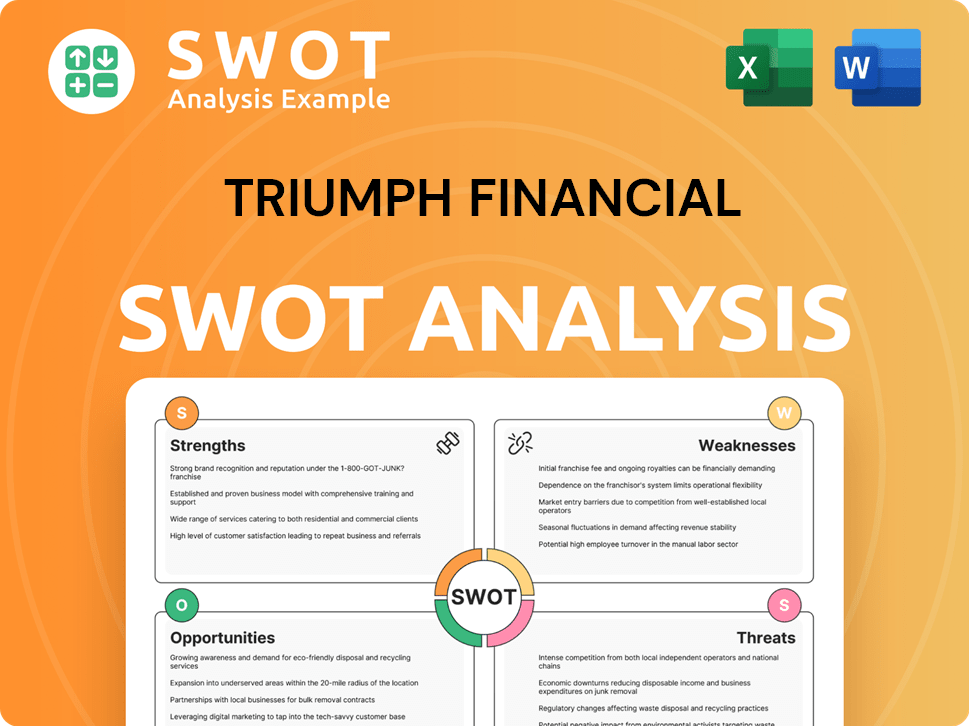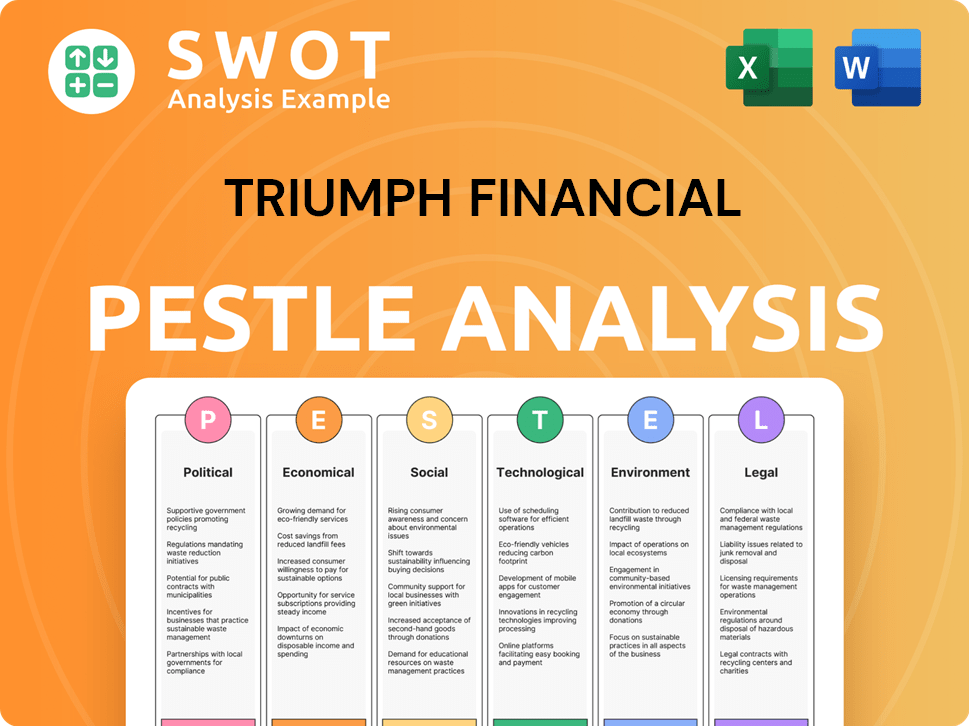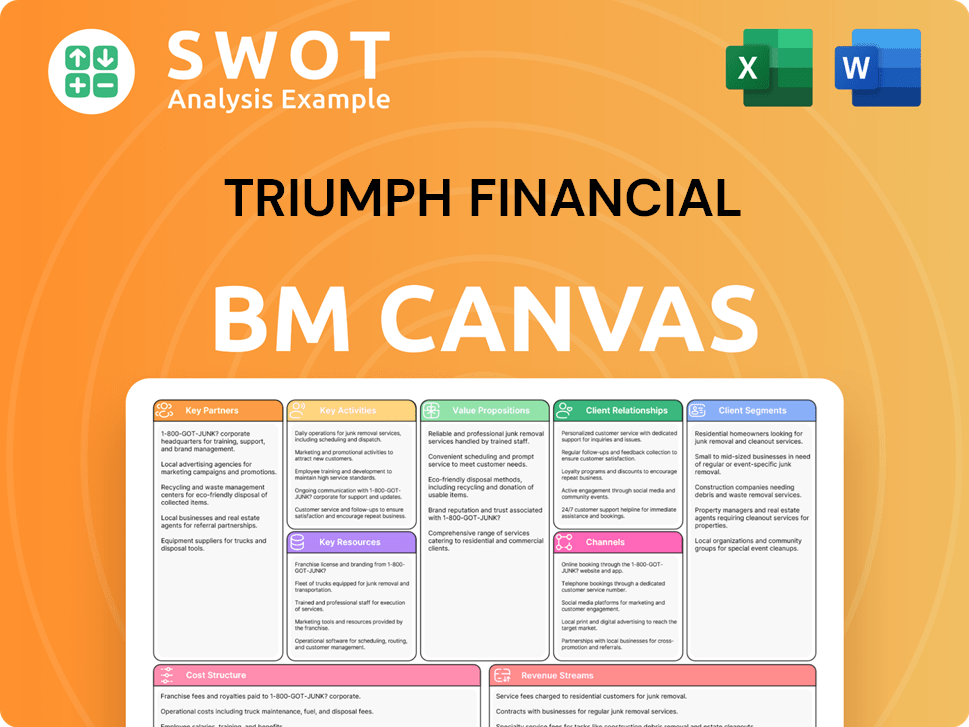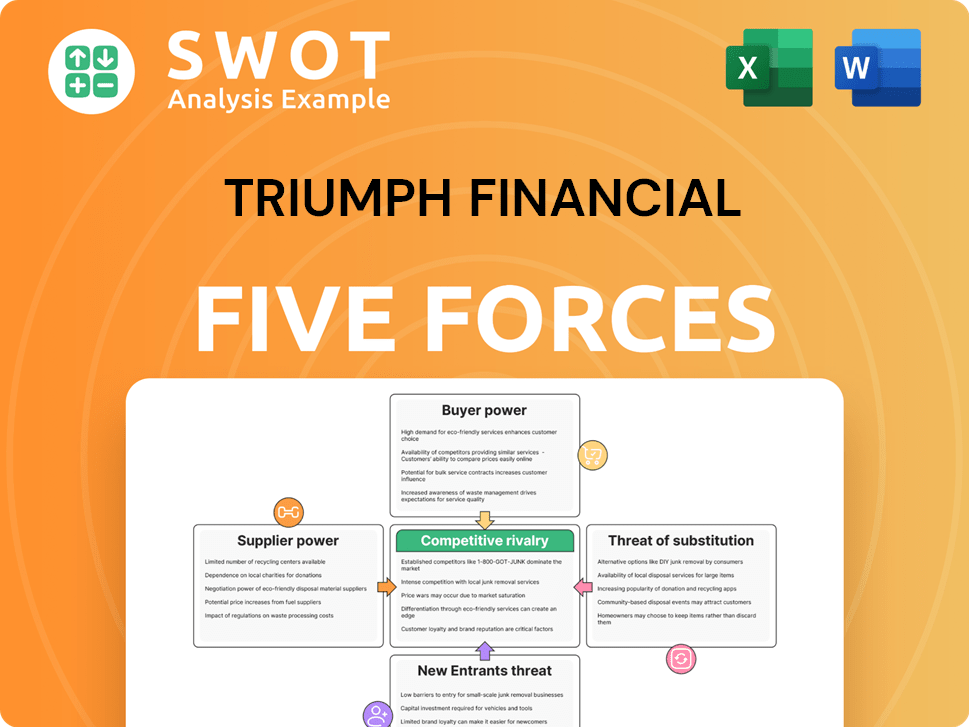Triumph Financial Bundle
Who Really Controls Triumph Financial?
Unraveling the ownership of a company is like deciphering its DNA, revealing the forces that shape its destiny. Knowing who owns Triumph Financial, a key player in the financial services sector, is crucial for investors and stakeholders alike. This knowledge provides critical insights into the company's strategic direction, risk profile, and long-term potential.

Understanding the Triumph Financial SWOT Analysis is just one piece of the puzzle; the ownership structure provides a deeper understanding of the company's trajectory. This analysis will explore the evolution of Triumph Financial ownership, from its roots as Triumph Bancorp to its current status as a publicly traded company. We'll dissect the influence of major shareholders, the role of the leadership team, and how these factors impact the company's performance. The question of "Who owns Triumph Financial?" is central to understanding its future.
Who Founded Triumph Financial?
The story of Triumph Financial, Inc. begins with its founder, Aaron P. Graft, who currently holds the positions of Founder, Vice Chairman, and Chief Executive Officer. In 2010, Graft and a group of investors initiated the venture by acquiring EJ Financial, including its banking subsidiary, Equity Bank. This acquisition marked the foundational step, with the entities subsequently rebranded as Triumph Bancorp and Triumph Savings Bank, setting the stage for the company's future endeavors.
While specific details regarding the initial equity distribution among the founding investors are not readily available in public records, the acquisition of EJ Financial was a critical move. This early strategic decision laid the groundwork for Triumph Financial's expansion and its focus on specialized financial services. The company's growth trajectory, marked by strategic acquisitions and its eventual IPO, suggests a broadening investor base over time, though the initial ownership structure was centered around Graft's leadership.
A key early strategic move was the 2012 acquisition of Advance Business Capital LLC, a transportation factoring company. This acquisition was pivotal in broadening Triumph's service offerings and establishing its focus on the transportation industry. Early backers beyond the initial investor group are not explicitly detailed in publicly accessible information, but the company's subsequent growth through acquisitions and its eventual IPO suggest a broadening investor base over time. No major ownership disputes or buyouts from the initial founding period are prominently reported, indicating a relatively stable early ownership structure under Graft's leadership.
The company's inception involved Aaron P. Graft and an investor group acquiring EJ Financial in 2010. This acquisition was a pivotal moment, leading to the formation of Triumph Bancorp and Triumph Savings Bank.
The acquisition of Advance Business Capital LLC in 2012 was a strategic move to enter the transportation factoring market. This move was crucial for the company's expansion.
Aaron P. Graft's leadership has been consistent since the company's inception, ensuring stability. The early ownership structure appears to have been relatively stable, with no major reported disputes.
The early strategic acquisitions highlighted a clear focus on providing financial solutions to the transportation industry. This focus has been a key driver of the company's growth.
The company's growth, marked by acquisitions and its IPO, suggests a broadening investor base. This expansion indicates increasing investor confidence in Triumph Financial.
Details on initial equity splits and early backers are not extensively available in public documents. However, the company's trajectory shows consistent strategic moves.
Understanding the Triumph Financial ownership structure begins with Aaron P. Graft's pivotal role as founder. The initial acquisition of EJ Financial in 2010 marked the beginning of Triumph Bancorp. The strategic acquisition of Advance Business Capital LLC in 2012 expanded services, particularly in the transportation sector. While specific details on early investors are limited, the company's growth suggests a broadening investor base. For more insights, you can explore the Competitors Landscape of Triumph Financial.
- Aaron P. Graft founded the company and remains a key figure.
- The acquisition of EJ Financial was the foundational step.
- The company's focus on the transportation industry was established early on.
- The investor base has likely expanded over time.
Triumph Financial SWOT Analysis
- Complete SWOT Breakdown
- Fully Customizable
- Editable in Excel & Word
- Professional Formatting
- Investor-Ready Format

How Has Triumph Financial’s Ownership Changed Over Time?
The ownership structure of Triumph Financial has evolved significantly since its inception. Initially operating as Triumph Bancorp, the company went public in 2014, trading on the Nasdaq under the ticker symbol TBK. This initial public offering (IPO) marked a pivotal moment, broadening its shareholder base. In December 2022, the company rebranded as Triumph Financial, Inc., and changed its ticker to TFIN, reflecting its strategic shift towards financial technology.
These changes reflect the company's growth and adaptation within the financial sector. The transition from Triumph Bancorp to Triumph Financial, Inc., highlights its evolution and strategic direction. Understanding the Revenue Streams & Business Model of Triumph Financial is crucial to grasp the impact of these ownership changes on its operational strategies.
| Ownership Aspect | Details | As of |
|---|---|---|
| Institutional Ownership | 91.47% | May 2025 |
| Mutual Fund Ownership | 70.03% | May 2025 |
| Insider Ownership | 2.45% | May 2025 |
As of May 2025, institutional investors hold a substantial 91.47% of Triumph Financial's shares, with mutual funds owning 70.03%. Major institutional shareholders include BlackRock, Inc., Kayne Anderson Rudnick Investment Management LLC, and The Vanguard Group, Inc. Insider ownership, representing holdings by executives and directors, stands at 2.45%. Aaron P. Graft, the Founder, Vice Chairman, and CEO, directly owns 0.56% of the company's shares, valued at $7.61 million as of June 2025. These figures highlight the significant influence of institutional investors and the direct involvement of key company leaders in the ownership structure.
Triumph Financial's ownership is largely dominated by institutional investors, reflecting its established position in the financial market.
- Institutional investors hold a significant majority of shares.
- Insider ownership, including key executives, represents a smaller but relevant portion.
- The ownership structure influences company strategy and governance.
- Understanding the major shareholders provides insights into the company's direction.
Triumph Financial PESTLE Analysis
- Covers All 6 PESTLE Categories
- No Research Needed – Save Hours of Work
- Built by Experts, Trusted by Consultants
- Instant Download, Ready to Use
- 100% Editable, Fully Customizable

Who Sits on Triumph Financial’s Board?
The current board of directors of Triumph Financial, Inc. is pivotal in the company's governance and strategic oversight. Key figures include Aaron P. Graft, serving as Vice Chairman and Chief Executive Officer, and Carlos M. Sepulveda, Jr., who is the Chairman of the board. Other board members include C. Todd Sparks, Charles A. Anderson, Debra A. Bradford, Frederick P. Perpall, Harrison B. Barnes, Laura K. Easley, Maribessl L. Miller, Michael P. Rafferty, and Richard Davis. The average tenure of the board of directors is 10.9 years, indicating a seasoned and stable leadership team.
While the specific representation of major shareholders on the board isn't detailed for each director, it's common for large institutional investors to have channels for communication or influence with board members. This ensures that shareholder interests are considered in decision-making processes. The board's composition and experience contribute to the overall stability and direction of Triumph Financial.
| Director | Title | Details |
|---|---|---|
| Aaron P. Graft | Vice Chairman and CEO | Member of the board |
| Carlos M. Sepulveda, Jr. | Chairman | Leads the board |
| C. Todd Sparks | Director | Board Member |
| Charles A. Anderson | Director | Board Member |
| Debra A. Bradford | Director | Board Member |
| Frederick P. Perpall | Director | Board Member |
| Harrison B. Barnes | Director | Board Member |
| Laura K. Easley | Director | Board Member |
| Maribessl L. Miller | Director | Board Member |
| Michael P. Rafferty | Director | Board Member |
| Richard Davis | Director | Board Member |
Triumph Financial's common stock trades on the NASDAQ Global Select Market under the ticker TFIN. There is no public information suggesting a dual-class share structure or arrangements that grant outsized control to specific individuals. Recent SEC filings, such as Form 4 statements, detail changes in beneficial ownership by directors and executive officers. For example, Edward Joseph Schreyer, Executive Vice President and Chief Operating Officer, sold 7,275 shares in June 2025, retaining 25,194 shares. The overall governance structure appears to adhere to standard public company practices.
The board of directors plays a crucial role in overseeing Triumph Financial. The company's stock trades on the NASDAQ, and there are no indications of unusual share structures. You can find more information about the company's structure and leadership by reviewing the latest financial reports and SEC filings.
- Aaron P. Graft is the Vice Chairman and CEO.
- Carlos M. Sepulveda, Jr. is the Chairman.
- The board has an average tenure of 10.9 years.
- Insider transactions are reported through SEC filings.
Triumph Financial Business Model Canvas
- Complete 9-Block Business Model Canvas
- Effortlessly Communicate Your Business Strategy
- Investor-Ready BMC Format
- 100% Editable and Customizable
- Clear and Structured Layout

What Recent Changes Have Shaped Triumph Financial’s Ownership Landscape?
Over the past few years, Triumph Financial's structure has evolved significantly. In December 2022, the company rebranded from Triumph Bancorp, Inc. to Triumph Financial, Inc., and changed its ticker symbol from TBK to TFIN. This shift highlighted a move toward a financial and technology focus, particularly within the transportation sector, emphasizing payments and factoring. Recent leadership appointments in March 2025, including Kim Fisk as President of Factoring, Todd Ritterbusch as President of Payments and Banking, and David Vielehr as President of LoadPay, further demonstrate the company's strategic alignment to boost operational excellence and growth.
Ownership trends show that institutional ownership remains dominant. In May 2025, institutional ownership consistently exceeded 91%. While some institutions increased their holdings, such as Bank of America Corp /DE/ and American Century Companies Inc. in Q4 2024, others adjusted their positions. Insider ownership saw a slight increase, rising from 2.31% to 2.45% in May 2025. However, there has been more insider selling than buying over the last two years, with insiders selling a total of 116,615 shares for $8,763,052.43, compared to 26,868 shares purchased for $941,028.32.
| Metric | May 2025 | Q4 2024 |
|---|---|---|
| Institutional Ownership | Above 91% | Above 91% |
| Insider Ownership | 2.45% | 2.31% |
| Shares Sold by Insiders (Last 24 Months) | 116,615 | N/A |
| Shares Purchased by Insiders (Last 24 Months) | 26,868 | N/A |
The company's strategic acquisitions, such as the May 2025 acquisition of Greenscreens.ai, are expected to boost data capabilities and potentially drive future revenue growth. Public statements and analyst reports suggest that while economic conditions may pose challenges, investments in new technology and strategic shifts are anticipated to lead to revenue growth in the latter half of 2025. There are no public statements about planned privatization or significant changes in public listing status for Triumph Financial, Inc.
Triumph Financial's ownership is primarily dominated by institutional investors, holding over 91% of the shares as of May 2025. This indicates strong confidence from major financial institutions.
Triumph Financial, Inc. operates as the parent company. The company's focus has evolved, emphasizing financial and technological solutions, especially in the transportation industry.
The ownership structure of Triumph Financial includes significant institutional holdings, with insider ownership also present, though at a smaller percentage. Insider activity shows more selling than buying in the last two years.
Yes, Triumph Financial is publicly traded on the NASDAQ under the ticker symbol TFIN. This allows for public investment and oversight of the company's performance.
Triumph Financial Porter's Five Forces Analysis
- Covers All 5 Competitive Forces in Detail
- Structured for Consultants, Students, and Founders
- 100% Editable in Microsoft Word & Excel
- Instant Digital Download – Use Immediately
- Compatible with Mac & PC – Fully Unlocked

Related Blogs
- What are Mission Vision & Core Values of Triumph Financial Company?
- What is Competitive Landscape of Triumph Financial Company?
- What is Growth Strategy and Future Prospects of Triumph Financial Company?
- How Does Triumph Financial Company Work?
- What is Sales and Marketing Strategy of Triumph Financial Company?
- What is Brief History of Triumph Financial Company?
- What is Customer Demographics and Target Market of Triumph Financial Company?
Disclaimer
All information, articles, and product details provided on this website are for general informational and educational purposes only. We do not claim any ownership over, nor do we intend to infringe upon, any trademarks, copyrights, logos, brand names, or other intellectual property mentioned or depicted on this site. Such intellectual property remains the property of its respective owners, and any references here are made solely for identification or informational purposes, without implying any affiliation, endorsement, or partnership.
We make no representations or warranties, express or implied, regarding the accuracy, completeness, or suitability of any content or products presented. Nothing on this website should be construed as legal, tax, investment, financial, medical, or other professional advice. In addition, no part of this site—including articles or product references—constitutes a solicitation, recommendation, endorsement, advertisement, or offer to buy or sell any securities, franchises, or other financial instruments, particularly in jurisdictions where such activity would be unlawful.
All content is of a general nature and may not address the specific circumstances of any individual or entity. It is not a substitute for professional advice or services. Any actions you take based on the information provided here are strictly at your own risk. You accept full responsibility for any decisions or outcomes arising from your use of this website and agree to release us from any liability in connection with your use of, or reliance upon, the content or products found herein.